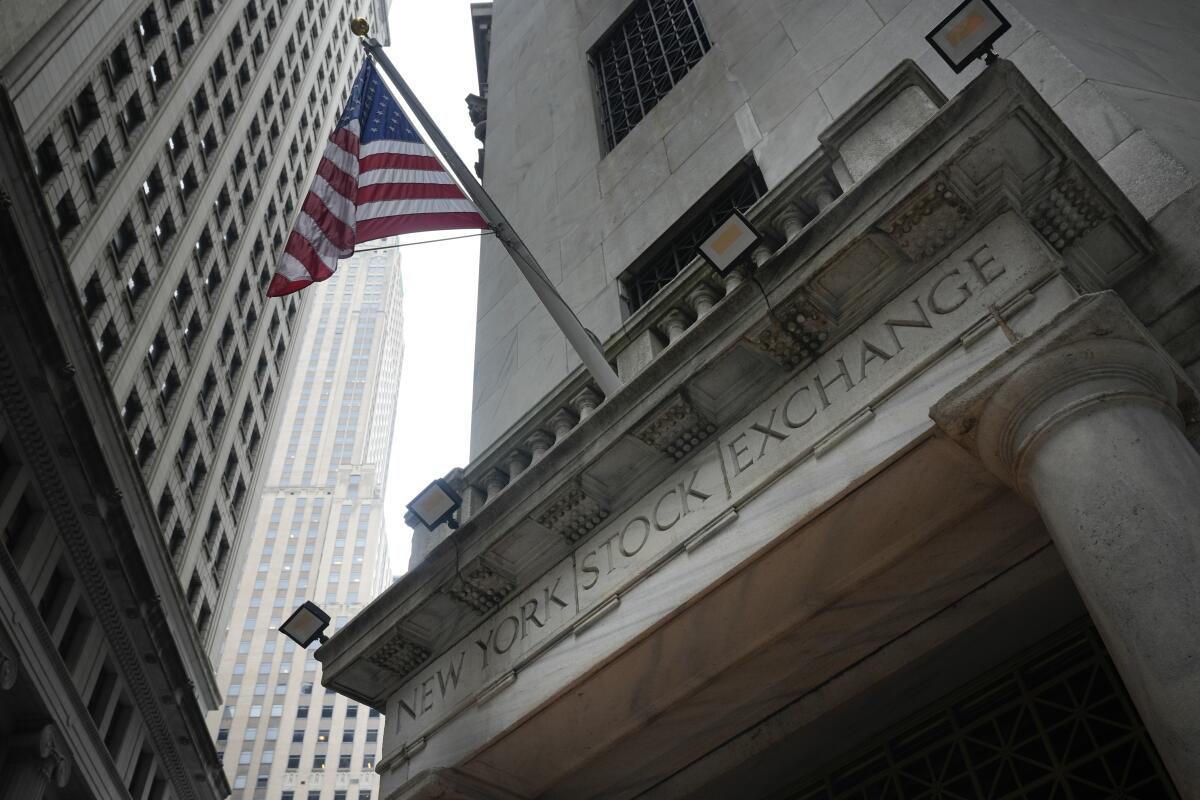Another winning week for Wall Street ends with more records

- Share via
Wall Street closed its latest winning week with more gains Friday, pushing U.S. stocks to new heights.
The Standard & Poor’s 500 rose 40.81 points, or 0.8%, to 5,137.08 a day after setting an all-time high. It’s been on a tremendous run and has climbed in 16 of the last 18 weeks because of excitement about cooling inflation and a mostly resilient U.S. economy.
The Dow Jones industrial average gained 90.99 points, or 0.2%, to 39,087.38. Technology stocks led the market, and the Nasdaq composite jumped 183.02 points, or 1.1%, to 16,274.94 a day after surpassing its previous record set in 2021.
In the bond market, Treasury yields eased after reports on manufacturing and sentiment among U.S. consumers came in softer than economists expected. They reinforced bets that the Federal Reserve may begin cutting interest rates in June, particularly after a report Thursday showed a key measure of inflation behaved pretty much as expected last month.
Dell Technologies helped drive the stock market after jumping 31.6%. It reported stronger profit and revenue for the latest quarter than analysts expected, highlighting demand for its AI-optimized servers.
Insurance companies deride him. The state insurance commissioner calls him out. But Harvey Rosenfield and his organization, Consumer Watchdog, have saved Californians lots of money.
A seemingly never-ending crescendo of demand for artificial-intelligence technology has helped catapult stocks higher over the last year. Dell has more than tripled in the last 12 months, while Nvidia has surged more than 260%.
NetApp leaped 18.2% after reporting stronger results than expected, saying it’s seeing “good momentum in AI.” The data company also gave a forecasted range for profit in the current quarter that topped what several analysts were expecting.
The mood was much more dour in the banking industry, where New York Community Bancorp tumbled 25.9%. It warned investors late Thursday that it found weakness in how it internally reviews loans, caused by ineffective oversight, risk assessment and monitoring activities.
The company said it won’t be able to file its annual report on time, and it took a charge worth $2.4 billion against its results for the last three months of 2023. Its chief executive stepped down after 27 years with the company, effective immediately.
Much attention has been on smaller regional banks after last year’s crisis in the industry led to the collapses of several. One of them, Signature Bank, was swallowed up by NYCB, which has caused the resulting bank to face stricter oversight amid struggles for loans tied to real estate.
Considering the enormous popularity of the “Barbie” film, one would expect Mattel to be soaring. Yet the company’s stock hasn’t performed well, and an activist investor is pressing for changes.
Although NYCB faces many issues that are specific to it, the worry has been that banks across the industry face challenges from loans made for real-estate projects.
They’re under pressure in part because the Federal Reserve has raised its main interest rate to the highest level since 2001, which can squeeze the financial system. The hope has been that the Fed will cut interest rates several times this year to offer some relief for banks and the broader economy.
The Fed has indicated it may do so if inflation continues to cool decisively toward its 2% target. But a string of stronger-than-expected reports on the economy have made traders push back forecasts for when the cuts could begin. The hope now is that the Fed could start in June after traders shelved earlier expectations for March.
Hopes for a June cut built after a report showed the U.S. manufacturing industry shrank in February for a 16th straight month.
Manufacturing has been one of the weakest-performing areas of the economy, while a resilient job market and spending by U.S. consumers have propped it up. The report from the Institute for Supply Management also said prices paid by manufacturers for raw materials rose again but at a slower pace than in January.
A separate report from the University of Michigan said sentiment among U.S. consumers was weaker than economists expected. It slipped in February from January but held most of the gains seen in recent months. That’s important because spending by U.S. consumers makes up the bulk of the economy.
In the bond market, Treasury yields sank after the reports. The yield on the 10-year Treasury fell to 4.18% from 4.25% late Thursday and from 4.28% just before the data’s release.
The two-year Treasury yield, which more closely tracks expectations for the Fed, sank to 4.53% from 4.62%.
Economists at Deutsche Bank expect the Fed to cut its main interest rate by 1 percentage point this year, down from its current range of 5.25% to 5.50%. Like many traders, they also expect the Fed to start in June.
But the bank’s chief U.S. economist, Matthew Luzzetti, said there are several reasons to be cautious about cuts. One is that stock prices have already rallied and Treasury yields have already sunk on expectations for coming cuts, which loosens conditions for the economy and could add upward pressure on inflation.
In stock markets abroad, Japan’s Nikkei 225 jumped 1.9%. Indexes rose more modestly across the rest of Asia and Europe.
AP reporters Matt Ott and Zimo Zhong contributed to this report.
More to Read
Inside the business of entertainment
The Wide Shot brings you news, analysis and insights on everything from streaming wars to production — and what it all means for the future.
You may occasionally receive promotional content from the Los Angeles Times.












